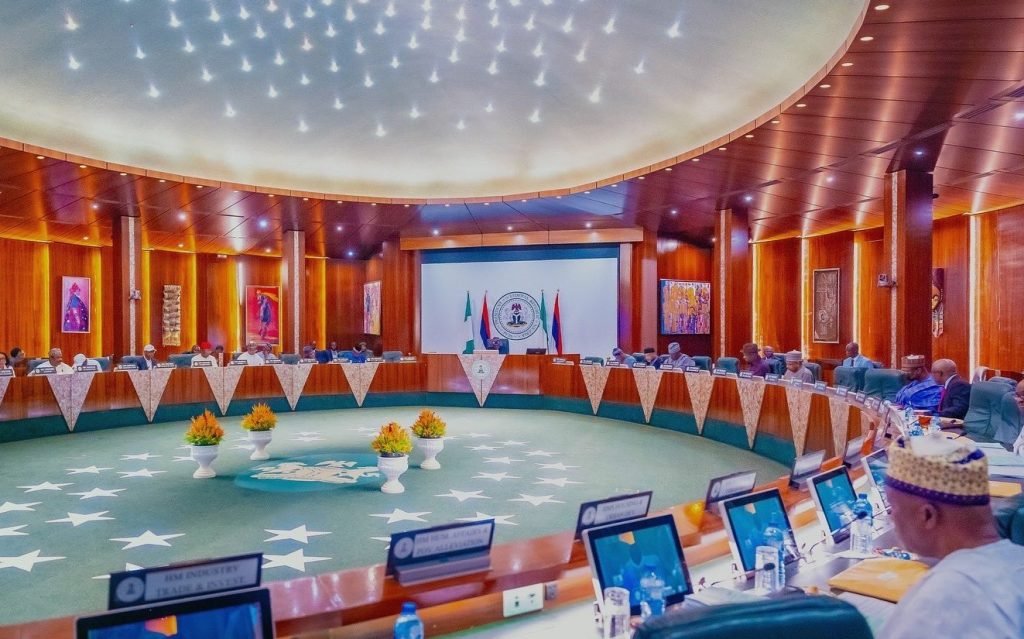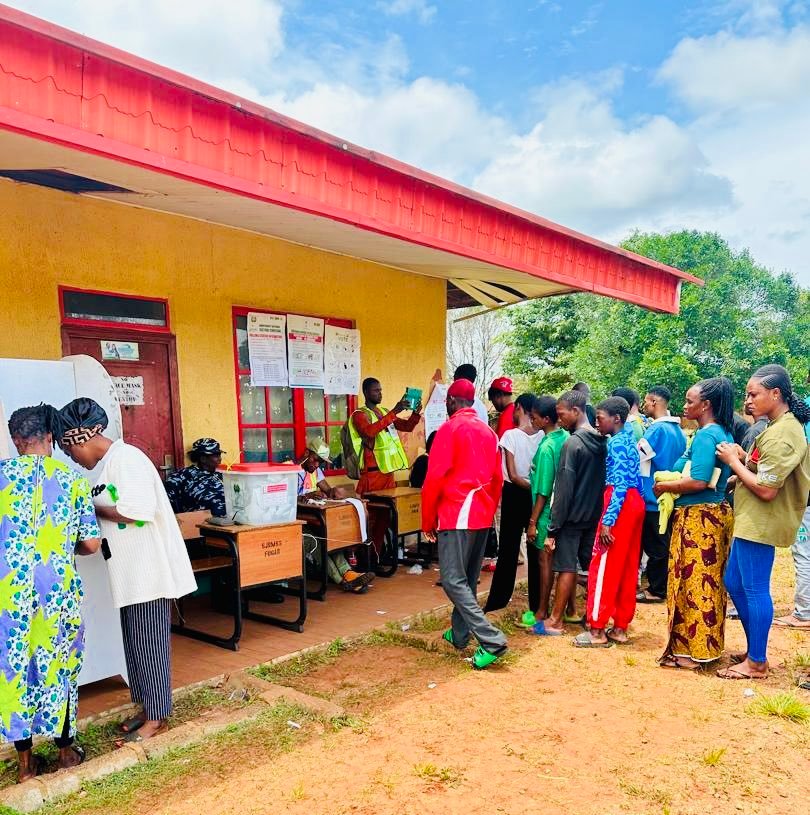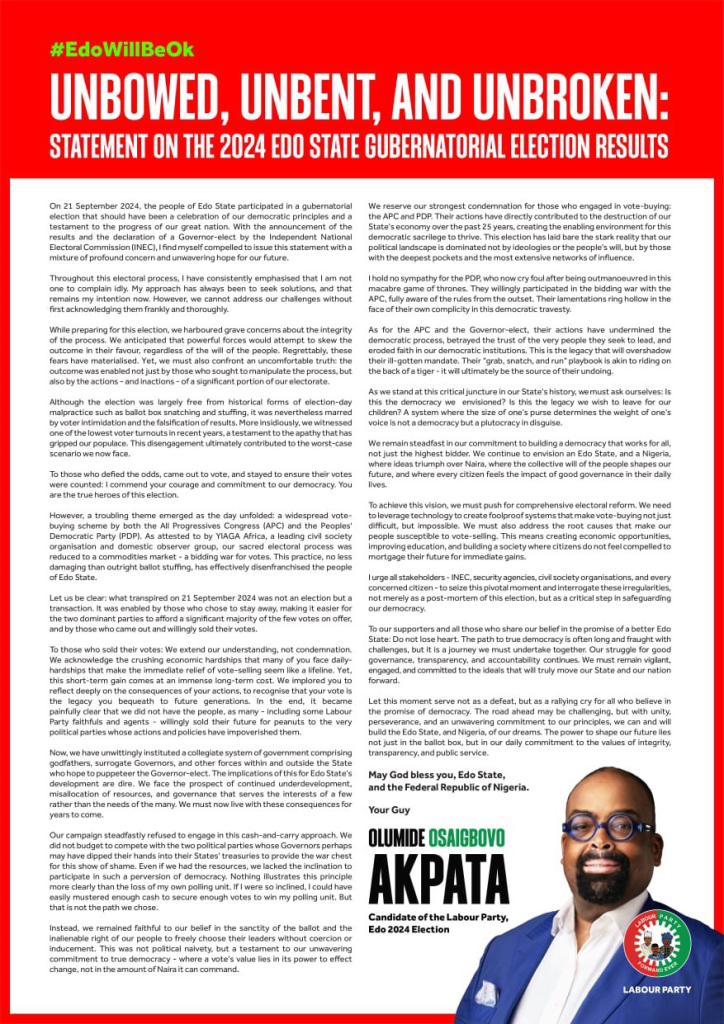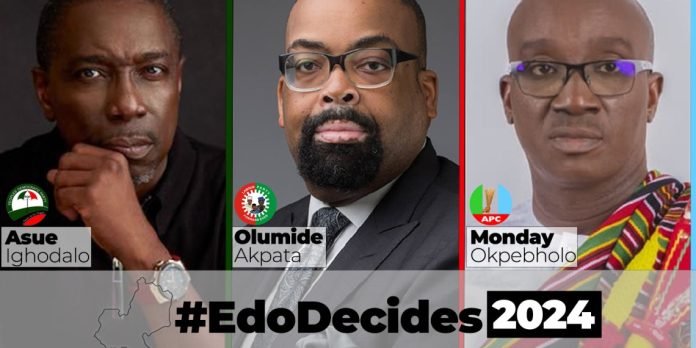The Edo State gubernatorial election held on Saturday, September 21, 2024, concluded with the Independent National Electoral Commission (INEC) declaring Senator Monday Okpebholo of the All Progressives Congress (APC) as the winner. Asue Ighodalo of the People’s Democratic Party (PDP) as the runner’s up, and Olumide Akpata of the Labour Party, finished third.
The election was marked by intense accusations and counter-accusations from all sides. Nigeria’s President Bola Tinubu of the ruling APC quickly welcomed the election results, framing his party’s victory as a testament to the broad acceptance of his policies by Nigerians.
In the Federal Executive Council (FEC), Monday September 23, the Secretary to the Government of the Federation (SGF), George Akume, praised the electoral process, calling it a “fantastic outing” for his party and commending President Tinubu for his dedication to democracy. Akume said the APC’s victory in Edo, which had eluded the party for over eight years, was a testament to Tinubu’s leadership and the party’s commitment to democratic principles.

“The election has been adjudged to be free and fair,” Akume stated, “and that is what Mr. President has always stood for. We want to thank you, Mr. President, for being committed to the electoral process and the ethos of democracy.”
Governor Dapo Abiodun of Ogun State also of the APC, congratulated Okpebholo and praised INEC for its commitment to democratic principles, despite all the vitriol from the opposition. He described the election as “peaceful” and noted that his party’s campaign was “focused on issues,” even though Senator Okpebholo shunned the gubernatorial debate of August 9 where “issues” were debated, attended by his rivals.
Allegations of Irregularities
Despite the congratulations from the ruling party, the election was not without controversy. Accusations of malpractice came from both losers and even the winners. Edo State Deputy Governor Philip Shaibu, who was edged out of the PDP race at the nomination stage, accused his boss, Governor Godwin Obaseki of PDP, of earmarking ₦73 million for vote-buying to secure victory.

Shaibu painted the governor as a dictator and pointed to a mass exodus of key political figures from the PDP to the APC, suggesting that Obaseki’s leadership style led to the party’s defeat.
The Decent Loser
Labour Party’s Olumide Akpata, a Senior Advocate of Nigeria and former President of the Nigerian Bar Association described the election as a “transaction” rather than a legitimate democratic process. Akpata alleged widespread vote-buying by both the APC and PDP and called for electoral reforms to combat these issues. He emphasized the need for technology to ensure free and fair elections in the future.
“The power to shape our future lies not just in the ballot box, but in our daily commitment to the values of integrity, transparency, and public service“
“What transpired on September 21, 2024, was not an election but a transaction,” Akpata said. Despite his criticisms of the alleged vote-buying, he extended his understanding: “To those who sold their votes: We extend our understanding, not condemnation. We acknowledge the crushing economic hardships that many of you face daily—hardships that make the immediate relief of vote-selling seem like a lifeline. Yet, this short-term gain comes at an immense long-term cost.”
“We did not budget to compete with the two political parties whose Governors perhaps may have dipped their hands into their States’ treasuries to provide the war chest for this show of shame. Even if we had the resources, we lacked the inclination to participate in such a perversion of democracy.
“This election has laid bare the stark reality that our political landscape is dominated not by ideologies or the people’s will, but by those with the deepest pockets and the most extensive networks of influence.

“Let this moment serve not as a defeat, but as a rallying cry for all who believe in the promise of democracy. The power to shape our future lies not just in the ballot box, but in our daily commitment to the values of integrity, transparency, and public service,” he concluded.
Civil Society’s Verdict
Civil society organization, Yiaga Africa, condemned the election, saying it failed the electoral integrity test. The group deployed observers across Edo and reported incidents of manipulation during the collation process in several local government areas. Despite INEC’s adherence to procedures during voting, Yiaga Africa highlighted that the integrity of the results was compromised.
“The best time to prevent injustice against you is when you fight injustice against others.”
It said, “While key processes such as accreditation, voting, counting, and recording of results at the polling unit substantially complied with procedures, the results collation process was compromised by the actions of some biased INEC officials in connivance with other actors.
“This manipulation severely undermined the overall integrity of the election“.
A Fractured Political System
The election results reveal the bitter political struggle for power in Edo State and broader concerns about Nigeria’s electoral system. While the APC and its supporters celebrate this victory, opposition parties and civil society groups raise questions about the integrity of the process which only the courts will adjudicate. Others continue the unending call for electoral reforms.
But the best time to prevent injustice against you is when you fight injustice against others.
Comment, Like 👍, share this article, and Follow us on our social media handles.







